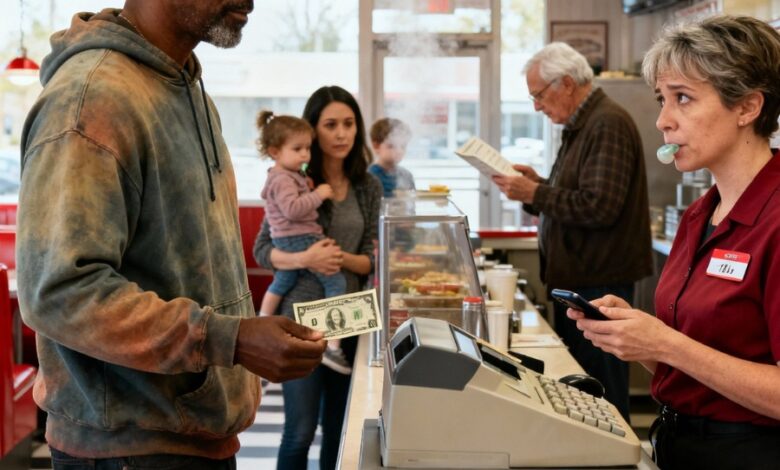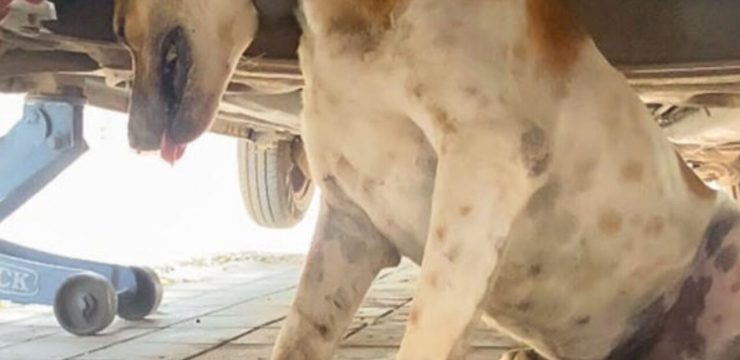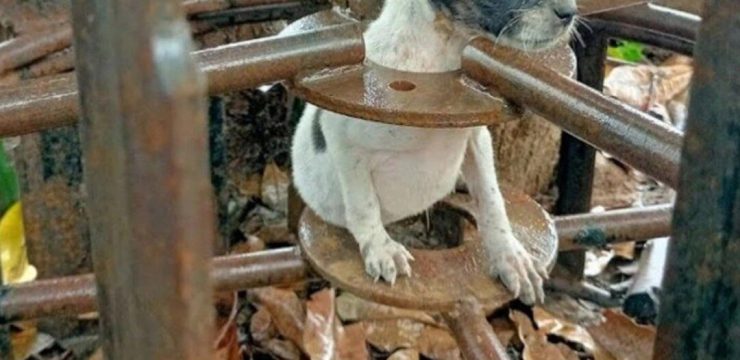Jordan Ellis stepped out of his black SUV on a cool Monday morning dressed in a way no one in the city would ever expect. Instead of his usual tailored suits and polished shoes, he wore faded jeans, a worn gray hoodie, and a knit cap pulled low over his forehead. Most people knew him as a millionaire restaurant owner whose watch alone cost more than a month’s rent downtown. Today, though, he looked like any tired man trying to get through another long week—and that was exactly what he intended.

He crossed the street toward his downtown diner, the very first location he had ever opened. Back when he built it, the idea of becoming a restaurant mogul seemed impossible. The memory of his mother standing behind him in the cramped kitchen—rolling out dough for pies, humming old country songs—always reminded him where he came from. This diner wasn’t just a business to him; it was the place where his dream had begun and where he learned the value of treating every customer with kindness.
The morning air carried the scent of sizzling bacon, brewing coffee, and warm bread. Normally, those smells filled him with pride. But today, they weighed heavily on his chest. Over the past few months, customer complaints had been piling up. Slow service, rude interactions, messy plates, and a sense that customers were treated as nuisances instead of guests. It wasn’t a single bad review—it had become a pattern, one he could no longer ignore.
Jordan suspected something deeper was wrong, something that couldn’t be fixed through emails or meetings. The only way to understand what was happening inside his business was to walk in unnoticed. And so today, disguised as an ordinary customer, he pushed open the diner door.
Inside, everything looked the same—red vinyl booths, checkered tile floors, chrome trim. But the warmth he remembered was gone. There were no greetings, no smiles, no sense of welcome. Only indifference.
Two cashiers stood behind the counter. A young woman in a pink apron chewed gum while scrolling through her phone. Beside her was an older woman with weary eyes and a name tag that read “Denise.” Neither of them acknowledged Jordan’s presence. He waited nearly thirty seconds before Denise finally snapped, “Next.”
He stepped forward with a polite, “Good morning.” She didn’t respond. She barely made eye contact while taking his order—a breakfast sandwich and black coffee. Her sigh made it clear she’d rather be anywhere else. She rang up his order, slapped the change onto the counter, and turned her attention elsewhere.
Jordan carried his food to a corner booth and watched quietly. The staff wasn’t overwhelmed; they were simply apathetic. An exhausted mother with two toddlers had to repeat her order multiple times before someone finally entered it. An elderly man asking about a senior discount was dismissed with a cold wave of the hand. A worker dropped an entire set of silverware and muttered an inappropriate word even children could hear.
Then Jordan heard something that made him freeze.
The young cashier leaned toward Denise and whispered, “Did you smell that guy who ordered the sandwich? Like he’s been sleeping somewhere rough.”
Denise didn’t hesitate. “This is a diner, not a shelter. Just wait—he’ll complain about the price next.”
They laughed.
Jordan’s jaw tightened. He didn’t care that they thought he was homeless. What angered him was that they would treat any struggling customer with the same disrespect. To him, dignity was not optional—it was the foundation his business was built on.
Moments later, a construction worker walked in, still dusty from the morning job. He politely asked for a cup of water while waiting for his meal. Denise looked at him with pure irritation and snapped, “If you’re not buying anything else, don’t hang around.”
That was the moment Jordan knew he couldn’t simply observe anymore. He stood, walked to the counter, and stopped a few feet away. The young cashier didn’t notice him—she was recording a video of herself making exaggerated faces for social media. Denise glanced up with the same flat tone. “If you have a complaint, the customer service number is on the receipt.”
Jordan didn’t blink. “I’m not calling customer service. I’m asking something else. Is this how you treat everyone, or just the customers you think don’t have money?”
The young cashier crossed her arms. “You’re twisting things.”
Jordan slowly removed his knit cap and hood. “No. I’m Jordan Ellis.”
Silence rippled through the diner. The cook froze mid-motion. A teenager eating pancakes nearly dropped his fork. The young cashier’s face lost all color. Denise took a step back, stunned.
Jordan spoke calmly but firmly. “I built this diner from almost nothing. My mother taught me that anyone who walks through these doors—anyone—deserves kindness. Whether they’re a CEO or someone with ten dollars in their pocket. And what I witnessed today is the complete opposite of that.”
The manager, Ruben, rushed out from the kitchen, startled. “Mr. Ellis, I didn’t know you were coming in.”
“That was the point,” Jordan replied. Then he faced the cashiers. “Both of you are suspended effective immediately. Ruben will determine whether you return after proper retraining. If you can’t respect the people who keep this business alive, you’re in the wrong place.”
The young cashier’s eyes filled with tears, but Jordan didn’t soften. “Don’t confuse being sorry with being caught. They’re not the same.”
After they left, Jordan stepped behind the counter, tied an apron around his waist, and began working. He poured coffee, carried trays, wiped tables, and greeted every customer with the warmth the diner had lost. People whispered, some smiled, and an older woman even applauded softly.
For the first time in years, Jordan felt the spark that had started this entire journey.
After a couple of hours, he stepped outside, breathing in the crisp air. He texted HR: “Mandatory empathy and service training. All locations. All staff. And managers must work one floor shift each month.”
Then he went back inside, tightened his apron, and took the next order—just like he did on day one. Not as a millionaire, not as a boss, but as someone who believed kindness should never be the exception.





